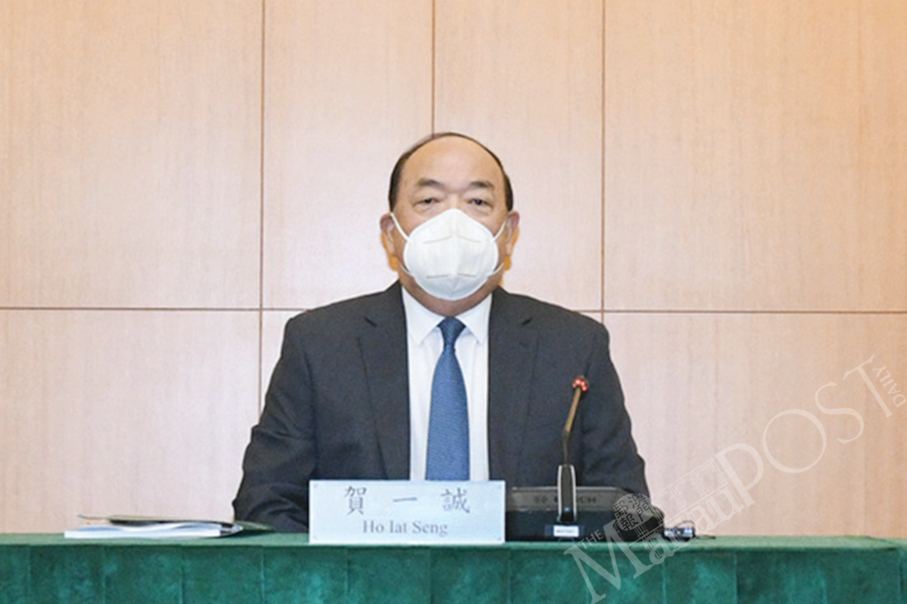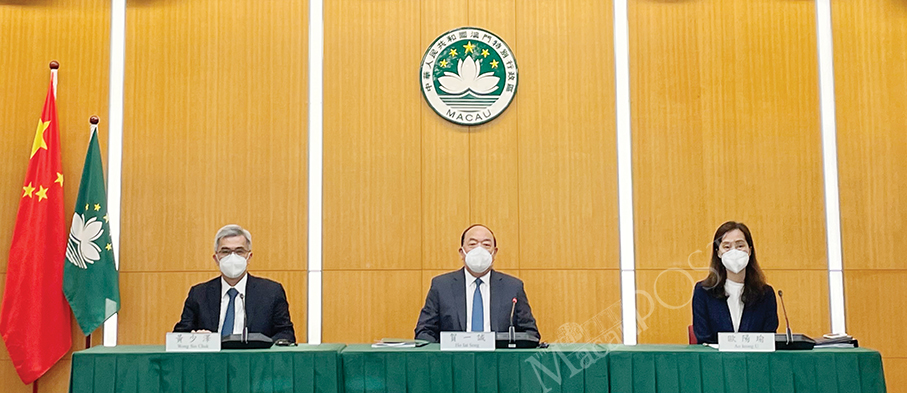Chief Executive Ho Iat Seng said yesterday that the preliminary viral genome sequencing of the current COVID-19 outbreak’s cases has indicated that the COVID-19 carriers have been infected with the Omicron subvariant BA.5.1, which, according to Ho, is one of the subvariants that is currently prevalent in the United Kingdom and the United States.
Ho said that the mainland’s health authorities have told the local health authorities that the BA.5.1 subvariant is not currently prevalent in the mainland.
Ho made remarks during a special press conference at Government Headquarters which started at 2:30 p.m. The 90-minute press conference was also attended by Secretary for Security Wong Sio Chak and Secretary for Social Affairs and Culture Elsie Ao Ieong U.
Ho underlined that while the BA.5.1 subvariant is even more contagious than other Omicron subvariants, such as BA.2.1, those infected with different Omicron subvariants will receive the same treatment, adding that health experts have provisionally concluded that those infected with the BA.5.1 subvariant will not suffer a more serious condition than those infected with other Omicron subvariants.
However, Ho indicated that the BA.5.1 subvariant is highly contagious because of which the local government has launched a series of strong measures, such as mandatory citywide nucleic acid tests (NATs), in order to cut off the transmission chains.
Ho said that as the BA.5.1 subvariant is not currently prevalent in the mainland, the local government is trying to find out how it has entered Macau. Ho said that the local government is assessing the possibility that the BA.5. subvariant has been imported into Macau through frozen food imported from foreign countries, or through items of residents who have undergone hotel quarantine after returning here from Western countries.
Casinos remain open
Ho noted that in early 2020 the local government decided to suspend local casinos’ operation for 15 days in response to COVID-19 because COVID-19 nucleic acid testing (NAT) was still not available at that time. However, Ho said, with the availability of COVID-19 NAT technology, the local government has reached an agreement with gaming operators according to which the local government will only suspend the operations of those casinos where COVID-19 cases have been reported, instead of suspending the operation of the whole gaming sector at one time.
No dine-in services
When asked by reporters about the government’s decision to ban restaurants’ dine-in services, which took effect at 5 p.m. yesterday, Ho said that the government had urged restaurants to suspend dine-in service since the current outbreak Started, but recent inspections by government officials had found that some restaurants were still providing dine-in services. Ho said that the local government has still not been able to identify the origin of the novel coronavirus that has caused the current outbreak, which was discovered on Saturday, therefore it has decided to ban restaurants dine-in services, but, he pointed out, they are allowed to provide takeaways so as to strike a balance between COVID-19 prevention and the operation of civil society and the economy.
The government yesterday also ordered the suspension of a host of entertainment venues which took effect at 5 p.m. yesterday. Ho reaffirmed that once Macau has reported zero new local COVID-19 cases, the government will then lift the suspension of the operation of the entertainment venues.
The government announced yesterday that all entertainment businesses, such as cinemas, beauty salons, karaoke bars, saunas, discos and massage parlours, have to remain closed from 5 p.m. yesterday, while all restaurants and other eateries were also ordered to suspend their dine-in services from 5 p.m. yesterday, but have been allowed to continue to provide takeaways.
Living with the virus
When asked about the nation’s dynamic zero COVID policy, Ho said he understood that there were certain opinions in civil society calling for Macau to “live with” the novel coronavirus, and some even calling for “lying flat” (躺平; tang ping in Pinyin), i.e., they want to “live with” the novel coronavirus without any COVID-19 prevention and control measures in place. Ho insisted that Macau would face an even bigger impact if the quarantine-free travel arrangements between Macau and the mainland could not be maintained if the local government would decide to drop the dynamic zero COVID policy.
Ho indicated that before the COVID-19 pandemic, around 400,000 entries and exits between Macau and the mainland were recorded on average per day. Ho said that before the current outbreak in Macau, the local government had been discussing with the mainland authorities the possibility of relaxing measures to allow more mainlanders to visit Macau.
Ho said that if Macau chose to no longer fight COVID-19, no mainlanders would be willing to visit Macau as they would need to quarantine when returning to the mainland.
Ho asked rhetorically that if Macau chose to give up the mainland tourist market, would Macau have enough visitors from foreign countries.
Ho said that it was not an easy thing to strike a right balance between COVID-19 prevention and the maintenance of civil society and the economy.
Epidemic ‘under control’
Ho acknowledged that Macau has been encountering a new wave of the COVID-19 epidemic, which has greatly affected and troubled most of the residents’ and people’s work and life. Ho described the current COVID-19 outbreak as much more complicated and severe than ever before, adding that the local government has continued to assess the risk of the epidemic, and take a series of measures to “strictly” prevent and control the current outbreak.
Ho underlined that the current COVID-19 outbreak is still under control, adding that the supply of daily goods has been increased and is stable, so citizens did not need to rush to buy them, adding that with the help from the mainland authorities he believed that the local government has the confidence to control the outbreak.
When asked about the predicted timeframe for controlling the outbreak, Ho said that based on Macau’s previous two COVID-19 outbreaks, both were brought under control within 14 days, adding the team of Zhong Nanshan, the nation’s renowned virologist, pulmonologist and respiratory disease expert, has participated in the anti-epidemic work in Macau since the first day of the outbreak, and has been hypothesising on the incidence rate and when the novel epidemic will complete its cycle while showing two different reports as reference materials for the government every day. Ho also said that the government will submit the data of the current outbreak’s second round of citywide nucleic acid testing drive to Zhong for analysis.
Meanwhile, the chief executive said he was grateful to all citizens and sectors for their high level of cooperation, tolerance and understanding during this period.

Chief Executive Ho Iat Seng addresses yesterday’s 90-minute special press conference at Government Headquarters about Macau’s current COVID-19 outbreak. Photo: GCS

Secretary for Security Wong Sio Chak (left), Chief Executive Ho Iat Seng (centre) and Secretary for Social Affairs and Culture Elsie Ao Ieong U look on during yesterday’s special press conference at Government Headquarters. Photo: Yuki Lei







